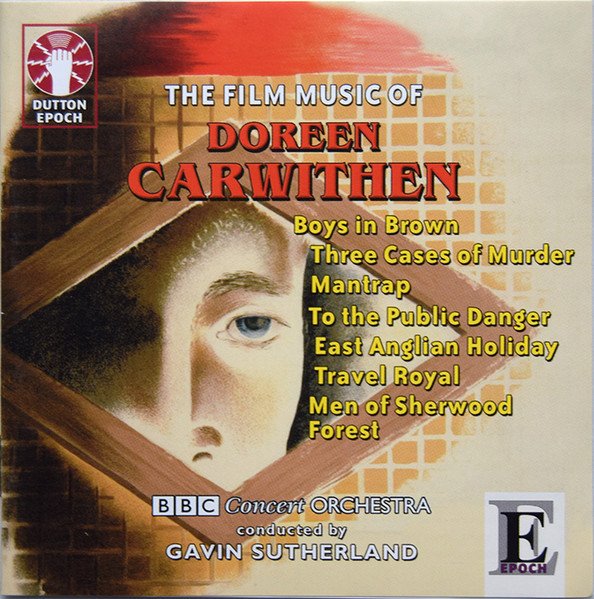Doreen carwithen: film music
2022 is the centenary of composer Doreen Carwithen (1922-2006) and like many a centenary before it, it has created a little flurry of interest in her. She has already featured in last year’s Prom for the first time since Iris Loveridge premiered her piano concerto under the baton of Basil Cameron in 1952, but this year she appeared in three separate concerts. (Don’t get too excited yet though - this is a feat accomplished by many a male composer - indeed Beethoven managed no less than 7 appearances this year, a tiny percentage of his 1546 outings across the years. Even Carwithen’s lover, Williams Alwyn, has managed 8 performances, ranging from 1927 to last year’s British film concert, in which Carwithen too had a work).
There have also been several CDs across the years, including recordings of her chamber music, orchestral works, and, as on this album, released in 2011, the film music for which she was best known. Having won the first J. Arthur Rank Film Composer Award in 1946 during her studentship at the Royal Academy of Music, Carwithen duly took up employment at the Denham Film Studios on the edge of West London, where she was an almost instant success. She would go on to compose the soundtrack for many films over the next decade, including for the official film of Queen Elizabeth I’s coronation.
This album demonstrates a good breadth of the types of film that Carwithen scored, from the swashbuckling Men of Sherwood Forest to the noir Three Cases of Murder. The films had varying degrees of success; contemporary reviews range from positive to incredulously dismissive, though none seem to mention the soundtrack (Carwithen struggled for recognition during her career, even in the form of parity of pay with the male composers who surrounded her at Denham).
The first track is the overture to The Men of Sherwood Forest from 1952. A review from three years later thought that “a plausible script, lively direction, delightfully uninhibited action, result in rattling good entertainment”. Carwithen’s string-based score evokes both the dashing chivalry of the plot, and a certain era of British film making. The film is available in its entirety on YouTube, and one only has to glance at lead actor Don Taylor’s moustache to be thrown back into nostalgia. Next is a three-movement suite from the rather grimmer Boys in Brown (1949), the story of an attempted escape from a borstal institution. The film starred such actors as Thora Hird, Dirk Bogarde and Richard Attenborough, and “created a sensation at home and abroad.” Carwithen’s score is surprisingly light for the subject matter, though the threatening undertones of the opening progression of chords hints at more.
The next two films are among Carwithen’s shortest, the 1948 To the Public Danger running at 43 minutes and East Anglian Holiday at a mere 20. This second opens with a beautifully foregrounded flute solo that makes this one of my favourites here, not least as it feels very different in listening aesthetic to the other scores. It is a travelogue from British Transport Films with the aim of encouraging local tourism, and Carwithen’s sunny score drives much of this.
Mantrap (1953) provides the next three-movement suite. This was a film that somewhat tanked in the U.K., despite the presence of Orson Welles in a bit part – indeed, one review dismissed it by remarking that the only good thing about it was that it was a good contrast to the film with which it had been paired. Three Cases of Murder (1955) too had a wary reception, mostly due to its triptych story delivery. Nevertheless, it had its share of enthusiastic responses, no doubt in part due to Carwithen’s atmospheric and unsettling soundtrack:
“This is a film the like of which you have never seen before, and you will be haunted long after your visit to the cinema by the memory of it. “Three Cases of Murder” is a film that cinemagoers will be all the richer for seeing. It is the sort of picture that one remembers like a shocking experience—so great is its impact.”
The album finishes with Travel Royal, a documentary from 1952.
What stands out from all of these scores is Carwithen’s extraordinary ability to handle the tools of her trade, from the palette of the orchestra to the soaring lines of the contemporary film style. Her technical expertise and capacity to capture the visual within the aural is second to none (she was apparently an extremely fast, dedicated and efficient worker as well, turning out the coronation score in three sleepless days).
Here is East Anglian Holiday
